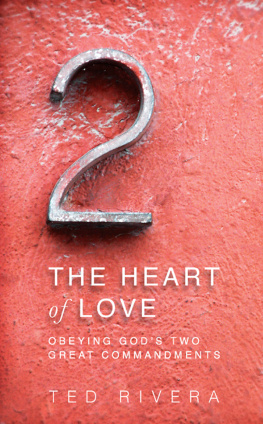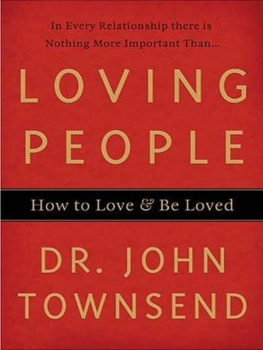Table of Contents
Landmarks
The priority of Gods love as the first love discussed in the previous chapter is an example of a difference between divine and human love that ought to exist and always will exist. If we try to make our human love the defining love, then we are seeking to oust God from his proper place. In this chapter we turn to a difference between divine and human love that arises because of sin, a difference that ought not to be, and a difference that will not be in the new creation.
The Story of Abelard and Heloise
To bring it into sharp relief I begin by telling part of the story of the medieval lovers Abelard and Heloise. This is a story that brings out the disordered character of human loves. It is also one of the most tragic love stories ever told in truth or fiction.
Abelard was a phenomenon in the French church of the twelfth century. At a young age he became master of the schools of Paris, where he taught philosophy and theology to crowds of enraptured students. He was proud of his achievements, and it was his pride that led him to temptation, as he explains in an autobiographical piece: I thought I was the only philosopher in the world and had nothing to fear from anyone, and now I began to give free reign to my lust.
Abelard and Heloise studied together, but soon, as he put it, we exchanged more words of love than of lessons, more kisses than concepts.
After some months the couple were caught by Fulbert and required to separate. They continued to meet in secret, and soon Heloise wrote to tell Abelard that she was expecting their child. While her uncle was away, Abelard took her from her house and moved her to Brittany to stay with his sister, where she gave birth to a son. Fulbert was enraged by the abduction, and Abelard sought to appease him by offering to marry Heloise.
Rather than being pleased with this plan, Heloise herself tried to dissuade Abelard from marriage. To her, Abelard was a glorious philosopher, standing in the line of the pagan Fulbert to keep the marriage secret. Heloise gave in, and the two were secretly married. To preserve the illusion, they parted and were able to see each other only occasionally.
Not surprisingly, this arrangement did not satisfy Fulberts concern for the honor of his house, so he began to spread news of the marriage. When Heloise kept denying it, the tension between them rose, apparently to the point of Fulberts abusing her. Abelard decided to send his wife away to the safety of the Abbey of Argenteuil, which would also serve to convince others that they were not married. This further angered Fulbert, since it appeared to him that Abelard was now just trying to get rid of his niece. He bribed Abelards servant, and then with some relatives entered his bedroom by night and castrated him. As Abelard himself described it, they wreaked the savage vengeance that has made the whole world shudderthey cut off the parts of my body with which I committed the wrong they complained of. In shame, guilt, and confusion Abelard fled to join the Abbey of Saint -Denys.
The relationship between Abelard and Heloise continued, but in a quite different way. While serving as the Abbot of Saint - Gildas de Rhuys in Brittany, Abelard learned that the nuns of Argenteuil had been expelled from their monastery, so he gave them his own oratory near Troyes as a new home. Heloise became its first abbess. She and Abelard thence saw each other when he preached for them, but their relationship was now that of a spiritual father and daughter, despite her abiding passion for him.
Disordered Love
It is evident from Heloises own words that Abelard stood in the place of God for her. But this is not quite right: God is present in the letters, but only to be accused or to be put firmly in second place to Abelard. She admits that this was her constant choice:
But in every circumstance throughout my life, as God knows well, I have feared an offense against you more than any offense against him, and I have sought to please you more than him. It was your command, not love for him, that brought me to put on this habit of religion.
In her mind Heloise even reimagined the practices of medieval religion around Abelard. When she desired to do penance, she was motivated by a desire to make satisfaction to him for his suffering and not to God for her sin:
I only wish it lay within my power to do a penance worthy of the wrong done against you , that at least by long contrition I could offer some recompense for the wound that you sustained and take upon my mind throughout a lifetime of remorse what your body suffered in that hour.
Gilson observes that the distress of Heloise on losing Abelard was the distress of a worshipper forsaken by her god.
We have seen that Heloise sinned against God, but it is also evident that she sinned more specifically against the Son of God. She replaced Christ with Abelard. She thought that without Abelard her heart could not exist; but it is in Christ alone that all things hold together (Col.
Selflessness Is Not Necessarily Sinless
Despite Abelards passionate appeals in his letters, there is no hint in their correspondence that God ever did regain his right place in the heart of Heloise. Part of the reason Heloise did not repent was that she thought she was largely innocent in her dealings with Abelard. According to the ancient ethical theory both she and Abelard favored, the morality of an act is determined solely by its intention: For blame does not reside in the action itself but in the disposition of the agent, and justice does not weigh what is done but what is in the heart. For Abelard and Heloise a good intention was defined by its selflessness. Heloise felt she was innocent because she had always denied herself and sought the good of Abelard. She would have subjected herself even to hell had he told her to:
But, as God knows, I would have followed you to Vulcans flames if you commanded it, and without a moments hesitation I would have gone first. My heart was never my own but was always with you, and now even more, if it is not with you it is nowhere: without you it cannot exist at all.
Unlike the Stoics on whom Abelard and Heloise based their theory, Scripture does not teach that selflessness is the measure of loves quality. Jesus did not just tell us to deny ourselves; he told us to follow him: If anyone would come after me, let him deny himself and take up his cross and follow me. For whoever would save his life will lose it, but whoever loses his life for my sake and the gospels will save it (Mark 8:3435 ).
Heloise may have been selfless in her love, but she sinned when she sought Abelards glory above Gods. She gave up her life by taking the veil for Abelard, not for Jesus.
The story of Abelard and Heloise is a tragedy, not a wonderful love story. At first glance there is something moving about the strength of Heloises devotion, but if we view it with clear sight we will realize that a willingness to follow a man into hell for his own sake is not admirable but abhorrent. We may indeed shed tears for Heloise, but they should be tears of sadness and pity, not wonder. If she did not repent and Abelard did, then, as
The Idolatry of Disordered Love
The tragedy of the beautiful and brilliant Heloise is that her heart locked itself onto Abelard and would never let go, even when God finally placed him beyond her reach. A disordered love - locked heart is a heart in the grip of an idol. To adapt a description from Shakespeares Juliet, Abelard was the god of her idolatry. The Bible is clear that idolatry is at the heart of sin. That is not to say that sin is to be understood only as idolatrythere are other essential aspects in any definition of sinbut sin is always at least idolatry. When the apostle Paul describes the ungodliness and unrighteousness of men (Rom. 1:18), he analyzes it as idolatry: Claiming to be wise, they became fools, and exchanged the glory of the immortal God for images resembling mortal man and birds and animals and creeping things (vv. 2223). God responds to idolatry by handing the idolater over to it:













